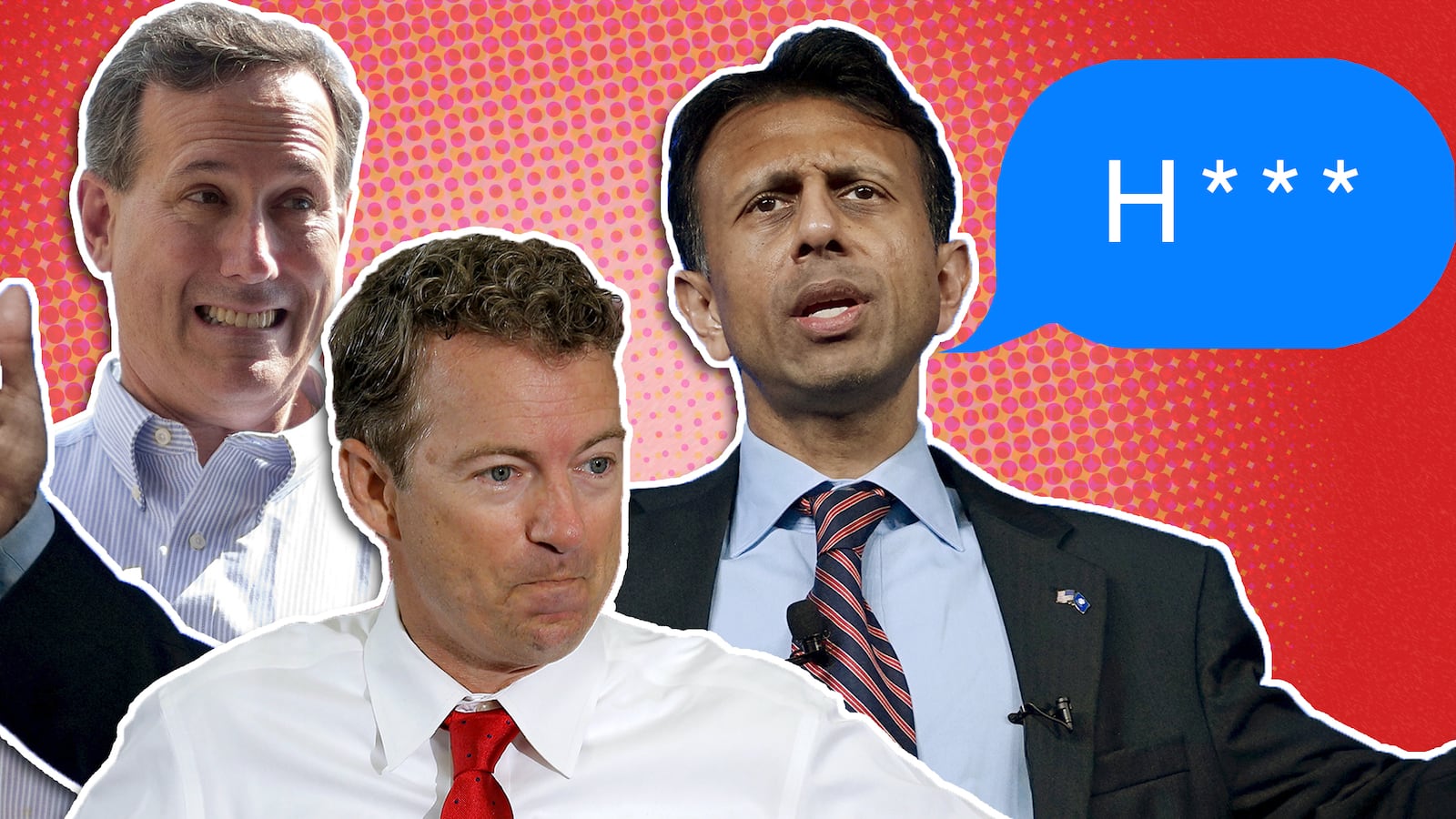In the 24 hours after the massacre inside Charleston’s Emanuel AME Church, GOP politicians and members of the conservative commentariat have tried to explain Dylann Storm Roof’s motivations on a spectrum that runs from merely murky to the explicitly anti-religious.
They have taken pains to avoid the abundant evidence that Roof was a sadly familiar figure: a young man motivated by racism to violence.
Louisiana Governor and passive presidential aspirant Bobby Jindal inserted the shruggie icon into the debate, averring that we should defer to the expertise of police detectives in sussing out the connection between Roof’s documented history of racist sympathies and his perhaps coincidental murdering of black people: “Law enforcement will figure out what his so-called motivations were.”
South Carolina Senator and presidential candidate Lindsey Graham pointed out that it’s Christians who are the serial killer flavor of the month: “It’s 2015, there are people out there looking for Christians to kill them.” His fellow campaign traveler Rick Santorum opined that the slaughter was part of a larger “assault on religious liberty.” And Rand Paul blamed the massacre on “people not understanding where salvation comes from.”
GALLERY: Remembering the Victims of Emanuel African Methodist Episcopal Church (PHOTOS)

Fox & Friends couldn’t help dumbing down the debate by framing it simply as an “Attack on Faith,” while anchor Steve Doocy wondered aloud how people could “unbelievably” “call it a hate crime.”
This is, of course, nonsense. The massacre was not an attack on faith. According to witnesses, Roof stated his goals and motivations as he committed the crime. He told the victims, “You’re raping our women and taking over the country. You have to go.” By Friday morning, CNN was reporting that he confessed he had wanted to start a race war.
The reliance on culture-war narratives rings even more hollow. Roof wasn’t some unhinged hippie atheist with contempt for conservative values; a high-school classmate told The Daily Beast that “he had that kind of Southern pride, I guess some would say. Strong conservative beliefs.” Roof joined white-supremacy groups, not the American Civil Liberties Union. He didn’t even ask some Christians to bake a cake for a gay wedding; he opened fire on a bunch of black people after watching them at Bible study.
So how can we explain conservatives’ misidentification of Roof’s motives? Could it be an overzealous application of “allegedly” to describe what happened (Perhaps they take so seriously the idea that Roof is innocent until proven guilty, they’re acting as his lawyers.) Then again, conservatives seem to be concerned about due process only in very specific instances. It’s not as if Roof has been accused of campus sexual assault.
No, the problem here is not that GOP politicians blame the victims. It’s that these days they desperately need to believe that they are also victims.
Depicting Roof as just another one of the foot soldiers in the war on Christmas steals unearned legitimacy from black Americans’ struggle on a scale that should give critics of Rachel Dolezal pause. It’s a theft of the Emanuel AME victims’ martyrdom that’s as capricious and as unaccountable as any Iggy Azalea appropriation.
Cynics might see the emphasis on faith as Republicans’ most current version of the “Southern Strategy.” They argue that comments such as Graham’s and Santorum’s are intentional spin, “whitewashing” Roof’s victims—they’re Christians just like us!—in order to opt out of the otherwise unavoidable conversation about race that Roof himself intended to end.
Or, even more deviously, the anti-Christian narrative is designed to gin up fear among base voters already nervous about same-sex marriage and Caitlyn Jenner. First they came for Memories Pizza, now the godless horde may be armed!
You may find that jaded interpretation a gloomy verdict on the state of our politics, but I actually hope it’s the case. Because if these people are refusing to engage in a discussion about the stain of slavery, at least they’re implicitly acknowledging the stain exists.
If they are intentionally perverting racial violence into base-stoking paranoia, at least that validates someone’s paranoia. (On Thursday, Marco Rubio posted to Twitter an image stating, “The world has become a more dangerous place,” turning Patriot Act propaganda into an accidental endorsement of what blacks all over America are feeling today.)
But what’s far more troubling is the idea that these GOP politicians truly believe Roof was on a Christian-killing mission. What if they are genuinely ignorant of the historical and cultural context of his actions? What if they earnestly believe themselves to be under equal threat? That would mean they live in a delusion so complete that not even nine dead black bodies can interrupt it. Do we dare ask how many bodies could?
We don’t yet know how much forethought Roof put into his actions. He specifically went to a black church, that we know for sure. As we learn more about the place and its congregants, Roof’s choice of target has taken on a gruesome, otherworldly poetry.
There’s the history of that black church, for instance, and how it intersects with a would-be slave uprising and Martin Luther King’s legacy.
There’s also the role that victim Clementa Pinckney, a church pastor and state senator, played in the aftermath of Walter Scott’s death—or, as Pinckney rightly called it, murder. Pinckney gave a floor speech in favor of police body cameras, which at first glance may seem only very generally related to his own fate. But Pinckney’s argument for the cameras echoes the debate over Roof’s motivations. It is a final and haunting couplet in Emanuel AME saga.
GALLERY: Charleston Church Shooting Aftermath (PHOTOS)

As Pinckney diagnosed it, those who questioned the existence of systematic police brutality were like Thomas the Apostle doubting Christ’s resurrection. Thomas eventually was able to put his hand on Jesus’s side and then believed. Likewise, Pinckney said, skeptics of police brutality “were able to see the video” of Scott’s murder and, “like Thomas…said, ‘I believe.’”
In other words, Pinckney looked at the murder of Walter Scott and saw a miracle. He saw one of the brightest silver linings imaginable. He saw hope reborn. He saw white Americans being given the chance to lay their hands on the metaphorical body of black America and examine its wounds—and he thought that evidence moved them. He thought they came to believe.
By calling Roof’s actions an “attack on faith,” conservatives are recoiling from the evidence before them. To say Roof was anti-religious is like Thomas voicing doubt even as his hand comes away covered in blood. That argument is worse than a lie, it is an insult to Pinckney, to the work he did to heal the nation’s wounds.
That argument is itself an attack on faith—the faith Pinckney had in us.





